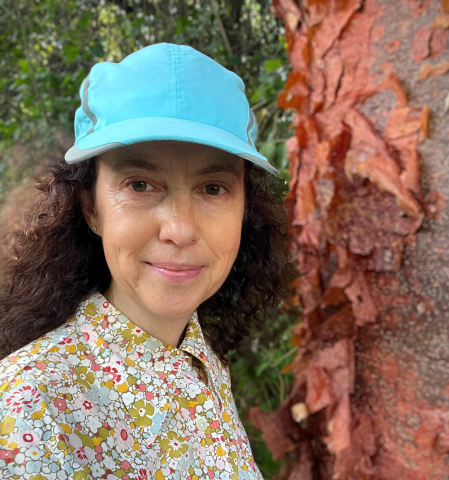
Dr. Ina Vandebroek, Senior Lecturer in the Department of Life Sciences, Faculty of Science and Technology (FST) at The UWI Mona next to a West Indian birch tree (Bursera simaruba).
Dr. Ina Vandebroek, Senior Lecturer in the Department of Life Sciences within the Faculty of Science and Technology (FST) at The University of the West Indies, Mona (The UWI Mona), has recently authored an insightful article aimed at elevating Caribbean traditional plant knowledge. Published recently in the prestigious journal Trends in Ecology and Evolution, the article emphasizes the rich diversity of unique plants in the Caribbean and underscores the cultural roots of traditional plant knowledge within communities of African heritage.
The Abstract of the publication states: The Caribbean is a hotspot of biological and cultural diversity, manifested in traditional plant knowledge of Afro-descendant peoples and other ethnicities. To strengthen the visibility of this knowledge in research, education, and policy making, we propose an eight-step action plan centered on reciprocal relationships with Caribbean plant stewards, especially subsistence farmers.
The authors of this significant publication have developed an innovative eight-step action plan intended to amplify the visibility and acknowledgment of family farmers and other traditional knowledge bearers. These individuals are vital custodians of the region’s botanical and cultural wisdom, contributing to research, education, and policy-making.
The action plan delineates crucial strategies that extend beyond the Caribbean, applicable to diverse settings. These eight fundamental goals include:
Building Strong Community Relationships: Valuing the knowledge and expertise of Caribbean family farmers in research endeavors.
Changing Academic Language: Ensuring that academic language supports the study and appreciation of Caribbean traditional plant knowledge.
Decolonizing Research Agendas and Methodologies: Aligning research practices with community perspectives and acknowledging Caribbean community members as plant custodians and field experts.
Using a Macro-Level Approach: Recognizing Caribbean traditional plant knowledge as a holistic system encompassing cultural and spiritual beliefs about nature.
Transforming Education Through Interdisciplinary Learning: Introducing an integrated curriculum for students that combines natural and social sciences.
Shifting Policy: Prioritizing strategies that appreciate and enhance unique biocultural traditions and intangible heritage.
Involving Citizen Science: Establishing robust connections with Caribbean civil society to promote and preserve traditional plant knowledge.
Accelerating Social Justice: Encouraging scholars to reconsider and decolonize their perspectives, fostering respectful collaboration with Caribbean communities to co-create knowledge.
Dr Vandebroek’s publication noted that “Although rooted in cultural traditions of the past, Caribbean plant knowledge is still actively practiced by local communities today, both in the region and among the diaspora, and continues to evolve.” By stark contrast, she continued, many actors inside and outside academia remain largely unaware of, or tend to ignore this knowledge. As a result, research mostly stays confined within ethnobotany and allied disciplines, relegating it to a niche area with limited inclusion in larger biology-related projects, education programs, or policy.
Dr. Vandebroek’s groundbreaking work underscores the importance of acknowledging and preserving traditional knowledge systems, positioning Caribbean communities as essential partners in scientific research and conservation efforts.

